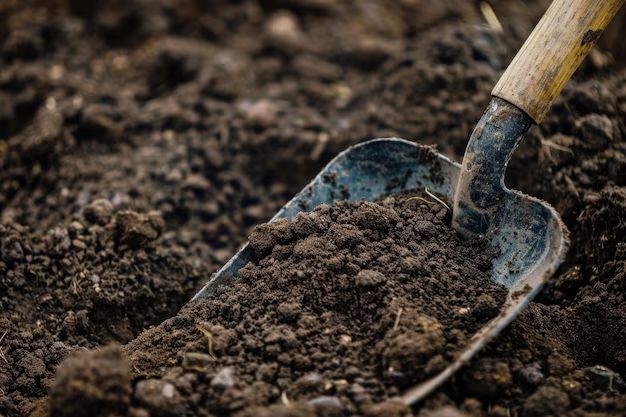A Surface Excavation of Some Deep Dirt
- By Jon Hagen
- •
- 01 Jan, 2025
Can You Dig It?

The sump pump under my house recently died. Since the crawl space is tight, I enlisted my limber, older son to join me to pull the old pump out and replace it with a new one. By the time we were finished, the clothes we were wearing was stained all over from the red clay of upstate South Carolina.
That’s a far cry from the rich, black farmland soil where I was born in central Iowa. Push a spade into that dirt, turn it over, and all kinds of life springs forth. There are the obvious creatures—worms, ants, beetles, snails, and slugs. But then there is all the microscopic life we can’t see—bacteria, fungi, viruses. One estimate indicates that in a single gram of soil there could be as many as 50,000 species of microscopic organisms. In other words, there’s a lot of life going on down there under our feet.
I’ve had random thoughts about dirt before, but my sump pump saga has me thinking it’s finally time to put some of those thoughts down on paper. I’ll say there is no New Year message here. Sorry. I just happen to be thinking about dirt these days. So, for your consideration, and hopefully for your edification…
~ When God created the first human, God created him from the soil of the garden. It happens that the Hebrew word for soil is “adam” and there’s some discussion among scholars as to when adam in Genesis is first used as a personal name. Regardless, adam does refer to the first person God creates, both in relation to the fact that Adam comes from dirt and that is his name.
~ It also happens that adam can mean “red” or “ruddy.” We could debate if we should take this literally, as in the first man was red-skinned or ruddy-complected. Either way, the Bible’s main point is to source the man as coming from the ground. Secondarily, I do think we have a strong argument to make that Adam had color in his skin. We refer to people as humans—hue-man—colored-man.
~ Not to gross anyone out, but we come from dirt and there are living things in that dirt. That’s why, as you grow older, things start growing out of your body. We’re slowly returning to dirt as we age. Which I think somehow connects to all those ceremonial laws in the Old Testament regarding the health and possible sicknesses of your skin and hair. Leprosy is definitely no bueno! In the education of the OT priests, there was likely a six-credit class called Dermatology 201.
~ This is why my family knows that whenever my mortal body goes into death-sleep, I want a natural burial. No embalming. No fancy casket. No concrete entombment. Just bury me in the dirt like a seed, plant a tree beside me, and wait. When the King returns, I will rise again. Praise God!
~ Just last week, I was watching a documentary on the 20th anniversary of the December 26, 2004, Indian Ocean tsunami that took around 230,000 souls in one cataclysmic day. As the waters began to recede, one scene that struck me was that of survivors kneeling and touching the ground with their lips. It was an act of abasement, of humbling oneself. The Christian Scripture provides examples where this same act is done for similar reasons (e.g., Job 2:12; Ps. 72:9; Lam. 2:10, 3:29). I wonder what it would take for us to learn how to so humble ourselves.
~ There’s a reason I don’t like the taste of hummus. It turns out that the Latin word, hummus, means soil, or earth, and that’s where we get the word humility. I’m convinced it requires some kind of supernatural act for a person to like eating hummus. I have not arrived.
~ While dirt is often associated with the lowering of oneself, it is also associated with greed and ego—as in, rich men, strongmen, and nations fighting over it. Yes, fighting over dirt! If history could give us a head count, I bet it would be worse-than-horrifying to know the number of lives lost in skirmishes, fights, and wars over dirt.
~ This past year I re-read Leo Tolstoy’s short story, “How Much Land Does a Man Need?” If you’ve never read it, or it’s been a while, I’d encourage you to read it.
~ Tolstoy’s story reminds me of Johnny Cash. If you don’t want to read Tolstoy’s story or don’t have time for it, then you really should listen to Johnny’s brutally honest and powerful song, “Hurt.” Better yet, watch Johnny sing it on YouTube (here). It’s a biographical sketch of his life, and here are a few lines from it:
What have I become, my sweetest friend
Everyone I know goes away in the end
And you could have it all, my empire of dirt
I will let you down, I will make you hurt
~ In the story of Job, part of his initial torment is when fire falls from the sky and consumes his property (1:16). Commentators Keil and Delitzsch say this fire is likely not ordinary lightening but more like brimstone falling upon the land (as in what happened to Sodom and Gomorrah). It’s interesting then that when the Satan continues on by attacking Job’s body, he does so in the form of fiery brimstone-like boils that cover Job from head to toe. The Hebrew reads, “burning sore.” Job is portrayed as a ruler, or king, and kings are tied to the land they rule, so it makes sense that the Satan would then go after both the king and his dirt.
~ In 2 Samuel 6, David is bringing the ark of the covenant back to Jerusalem. The ark was being pulled on a cart by oxen. At one point along the way, the oxen stumbled, and the ark began to slide. A man named Uzzah was right there as it was happening. Wanting to preserve the sanctity of the ark, Uzzah reached out his hand and grabbed the ark to prevent it from hitting the ground. Upon which God immediately strikes Uzzah dead. One commentator I read years ago, and who I cannot seem to track down now, said the reason Uzzah died is because he thought his hand was cleaner than the dirt on the ground! So many thoughts there worth teasing out at some point…
~ Let’s go back to the Garden of Eden where this all begins. There are rivers that flow out of and through that rich soil to nurture and bless all that it touches. Jesus likens our heart to a garden and a river flows out of it. When we’re living under sin, what flows out of us are defiling issues. But when the Redeemer invades the ground of our heart and does His purifying work, then living water bubbles up and flows out to nurture and bless all that we touch.
Happy New Year, everyone.








